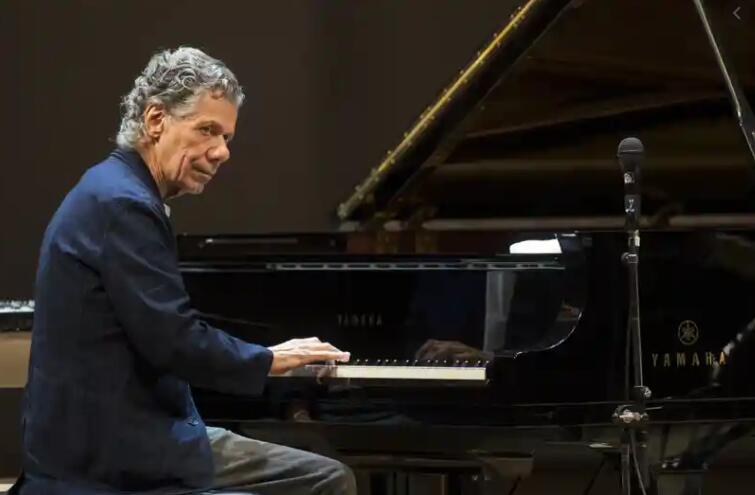That adventure was to last a lifetime. Over the decades he won 23 Grammys and 67 nominations for his reinvigoration of jazz. He played to packed houses the world over, touring with barely a break. Yet he found it odd to be celebrated as a jazz-fusion pioneer, as if you could say where one sort of jazz ended and another began. He treated music more like a swimming pool, where he just jumped in and had fun.
這樣的冒險將持續一生。在過去的幾十年里,他獲得了23項格萊美獎和67項格萊美獎提名,為重振爵士樂做出巨大貢獻。他在世界各地演出,場場爆滿,巡回演出幾乎是連軸轉。然而,他覺得自己被譽為“爵士融合的先驅”很奇怪,就好像人們談論一種爵士樂的沒落和另一種爵士樂的興起。他對待音樂更像一個游泳池,他只是跳進池里,游得盡興罷了。

Fusion, in any case, went on all the time. As soon as you played a piece with anyone, you exchanged ideas. As a young player in New York in the 1960s he had learned from everyone he gigged for: from Stan Getz, who tamed his wildest side and taught him melodic simplicity, to Mongo Santamaria, who shaped his African-Cuban instincts with the beat of a conga drum. (He felt so passionately Spanish, or Cuban, by the end of his gigs in Harlem that it was odd to think his ancestry was Italian.) Even the “older guys”, Mozart, Chopin, Scriabin, were still teaching him, his kindred spirits. He once wove Mozart’s Sonata in F major into Gershwin’s “The Man I Love”, and was amazed at how well they went together.
無論如何,碰撞融合一直在進行。只要與人合奏,大家就會交流心得。上世紀60年代,奇克還是紐約的一名年輕演奏者,他向所有的合作伙伴虛心求教:斯坦·蓋茨(Stan Getz)馴服了他最野性的一面,教他簡單的旋律;蒙戈·桑塔瑪利亞(Mongo Santamaria)用康加鼓的節拍塑造了他非洲古巴人的本能。(在哈萊姆區的演出結束時,他產生一種自己是熱情的西班牙人或古巴人的錯覺,甚至覺得自家祖先是意大利人的理念十分荒誕。)甚至那些“老家伙”,莫扎特、肖邦、斯克里亞賓,也在潛移默化地影響著他,找到志同道合的人。他曾把莫扎特的F大調奏鳴曲編入格什溫的《我愛的人》中,并為二者的完美結合而感到驚訝。
In music, jazz especially, one exploration naturally led to another. He had only to think how he composed, hearing a tune in his head, playing off it, adding on, doodling with crayons to jog his creativity along. Sometimes he wrote phrases down, or composed at a keyboard so they were stored. All too often, though, he couldn’t catch them.
在音樂領域,尤其是爵士樂版塊,每一次探索自然會引領出另一番天地。他只需要思考如何作曲,腦海里譜出一段曲子,演奏出來,不斷修改,用蠟筆涂鴉來激發他的創造力。有時,他會把樂譜寫下來,或者在鍵盤上作曲,這樣就可以把曲子記錄下來。但很多時候,他都捕捉不到這些音符。
Music, like a waterfall, never stayed still, and nor did bands. But that was good. Every change of players brought in something fresh.
音樂像瀑布一樣,從來不會靜止不動,樂隊也一樣。而可貴之處正在于此。每一次演奏都會帶來一些新鮮的東西。
An Egyptian snare drum sent his music in one direction, a flute in another. He tried duos with a vibraphone-player, Gary Burton, and a banjoist, Bela Fleck, to see what strange, thrilling sounds came through.
埃及小鼓將他的音樂引向一個方向,長笛則引向另一個方向。他試著與電顫琴演奏者加里·伯頓(Gary Burton)和班卓琴演奏者貝拉·弗萊克(Bela Fleck)同臺表演,就是想知道能碰撞出什么奇怪而又刺激的聲音。
When he set up an online academy later and asked the young to send in questions, it was at least partly to provoke new thoughts. He welcomed wrong notes, didn’t much mind miscues: they could pitch him down a different path.
后來,他建立了一個線上學院,并讓年輕人提問,這至少在一定程度上是為了激發新思路。他歡迎錯誤的意見,不介意出現失誤:它們可能會讓他走上一條不同的道路。
譯文由可可原創,僅供學習交流使用,未經許可請勿轉載。











